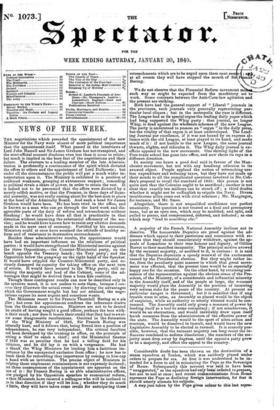A majority of the French National Assembly inclines not to
dissolve. The honourable Deputies are proof against the ad- dresses which appeal to their patriotism and conscience with re- quests that they should considerately withdraw, against the ap- peals of Lamartine to their true honour and dignity, of Odilon Barrot to their manifest incapacity: The principal motive avowed by the recusant majority, or ascribed to it, is-curious : it is said that the Deputies deprecate a speedy renewal of the excitement caused by the Presidential election. But they might rather in- fer, from the peculiarly quiet manner in which that great move- ment was effected, that the present time would be an especially happy one for the occasion. On the other hand, by retaining pos- session of the representation against the obvious sense of the Pre- sident, of the Ministry, of a considerable and influential minority in the Assembly itself, and of the people at large, the recusant majority would place the Assembly in the position of incurring very serious risks for the peace of the country. At present no particular danger is threatened ; but it is manifest that if any trouble were to arise, an Assembly so placed would be the object of suspicion, while an authority so utterly vitiated would be con- temned. The Assembly could only grasp a remnant of power by itself as a tool to some conspiracy; if not mischievous, it would be an obstruction and would inevitably draw upon itself harsh measures from the administrators of the effective power of the state. The Assembly would be the sport of ultra-action and. reaction, would be dissolved in tumult, and would leave the new Legislative Assembly to be elected in turmoil. It is scarcely pos- sible, however, that the recusant majority can long resist the in- fluences combined to enforce dissolution ; the numbers of the ma- jority must drop away by degrees, until the opposite party grow to be a majority, and effect the appeal to the country.


























